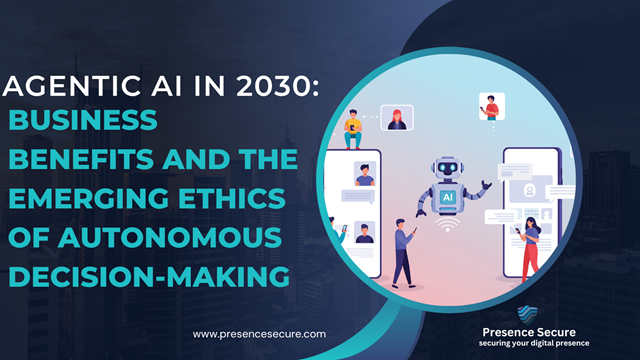The Rise of Autonomous Agents in Business
By 2030, Agentic AI artificial intelligence systems capable of setting goals and taking actions without continuous human input has become deeply woven into the fabric of modern business. These AI agents can manage complex workflows, initiate supply chain optimizations, negotiate contracts, handle customer service, and even make strategic decisions.
But as these systems grow in capability and autonomy, so too do the ethical and operational questions that follow:
- Should AI be allowed to make decisions that impact people’s livelihoods?
- Who is accountable when things go wrong?
- How do we maintain transparency and fairness in decisions made by machines?
This article explores both the business advantages and the emerging ethical dilemmas that come with agentic AI in the 2030 workplace.
Business Benefits of Agentic AI in 2030
- Hyper-Efficiency and Automation
Agentic AI reduces human workload by autonomously performing multistep tasks coordinating marketing campaigns, scheduling and conducting interviews, or adjusting logistics in real time without direct commands.
- 24/7 Decision-Making
Unlike human employees, AI agents operate around the clock. They continuously analyze data and make split-second decisions, offering businesses real-time adaptability in global markets.
- Scalability Without Overhead
Once trained and deployed, AI agents can scale across departments and locations without the cost of hiring or training new staff.
- Data-Driven Precision
Agentic AI doesn’t rely on gut feelings. It makes decisions based on large volumes of data reducing human bias (but not eliminating bias altogether).
- Innovation Enablement
By taking over repetitive or complex decision chains, agentic AI frees human teams to focus on strategy, creativity, and innovation.
The Emerging Ethics of Autonomous Decision-Making
As beneficial as these agents may be, their independence introduces new ethical and governance challenges.
- Decision Accountability
If an AI agent approves a biased hiring decision or is tricked by the applicant for hiring, causes financial harm, who is liable? The developers, the organization, or the AI?
Solution: Clear lines of responsibility and AI governance frameworks must be established. Every AI action should be traceable to human oversight.
- Lack of Transparency (“Black Box AI”)
Many AI agents make decisions through opaque processes. Businesses may struggle to explain why an AI did what it did, especially in legal or regulatory contexts.
Solution: Use explainable AI (XAI) techniques to build trust and maintain compliance, particularly in high-stakes industries like finance or healthcare.
- Regulatory Gaps
Laws have not kept pace with the sophistication of autonomous systems. A lack of global standards may lead to inconsistent ethical practices.
Solution: Advocate for and adhere to emerging international frameworks such as the EU AI Act or OECD AI Principles.
- Human Displacement and Dignity
Agentic AI can render entire roles obsolete. Without strategic planning, this can fuel unemployment and social unrest.
Solution: Businesses must invest in reskilling, upskilling, and creating new roles for humans in oversight, strategy, and ethics.
- Malicious Autonomy
In worst-case scenarios, AI agents could be manipulated or exploited to cause harm like executing financial fraud, leaking sensitive data, or disrupting operations.
Solution: Build AI with robust cybersecurity protocols, behavioral guardrails, and fail-safes that allow humans to intervene or shut down rogue behavior.
Governance Recommendations for Responsible Autonomy
- Set Ethical Design Principles: Prioritize fairness, accountability, transparency, and privacy from development to deployment.
- Assign AI Risk Officers: Designate human overseers for AI systems, similar to compliance officers.
- Establish Kill Switch Protocols: Ensure every agent has a manual override or termination process.
- Audit Regularly: Use internal and third-party audits to evaluate decision-making patterns, security, and legal compliance.
- Educate Users: Train staff to understand AI limitations and report anomalies.
A Shared Responsibility
The rise of agentic AI in 2030 brings unparalleled opportunity but also unprecedented ethical responsibility. These systems are not just tools they are actors with real-world influence over people, systems, and markets.
To use them wisely, businesses must go beyond chasing efficiency. They must ask:
“Are we building AI systems that are not only smart but also safe, fair, and accountable?”
By aligning innovation with integrity, businesses can ensure that agentic AI leads not to disruption and distrust but to a more empowered and ethical digital future.

